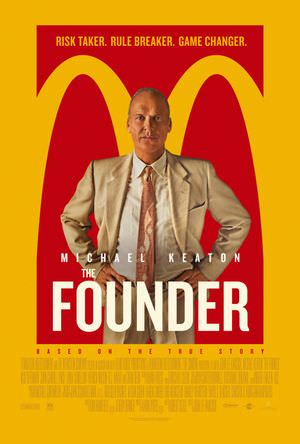The Founder Reviews and Ratings

-
The Founder focuses too much on the business side of things — including a passing reference to Coke sponsorship of menus — to give us an insight into the man whose ambition now feeds “1% of the world’s population” at any given time.
-
The film occasionally loses momentum, especially in its exposition-heavy first half. Overall, The Founder does not amount to a gourmet meal, but it’s worth a drive-through.
-
This business drama falls short of being a powerful biopic but if you are a loyal customer of McDonald’s, a budding businessman or a Michael Keaton fan, you’ll like it.
-
Watch it by all means. It’s an interesting tale of greed and ambition and a treatise on why, in business, there are no good men, and why only the rotten ones flourish.
-
The Founder and it’s recreation of the ’50s and ’60s American culture and capitalism is insightful and enriching. It skips on the McDonalds story on Wall Street completely, but it does do complete justice to the story of Ray Kroc taking over the McDonalds business from the simple and unassuming McDonalds brothers. This film just like the McDonald’s service model and burger is quick, clean and leaves you thoroughly satisfied.
-
Keaton plays Kroc singularly driven by the urge to do more. He may be a pathetic human being but make no mistake he is a vulture when it comes to business. It’s a vigorous performance aided by poignant turns from the rest of the cast included Laura Dern who plays his neglected wife. But for the performances, this film would have been just a little too wishy-washy in its attempts to overlook the predator in the man!
-
What works for the film is how unhinged Kroc is and the way he is presented as a straightforward asshole. There is absolutely no gray area at all – Kroc is the very definition of an opportunist spineless businessman as we go through a series of montages containing his rapid-fire business dealings.
-
The ending feels a bit rushed as everything wraps up a bit too soon. But as the credits roll, with Ray Kroc’s voice delivering a speech over soft music, you leave feeling more insightful about the billion-dollar corporation.
-
John Lee Hancock’s film is tougher on its subject than I expected it to be; Kroc is shown neglecting his wife, dumping her once he’s successful, manoeuvring the franchise out of the hands of the hapless Mac and Dick. Yet, even this hard-nosed opportunism is presented as a kind of ode to capitalism and straight-talking American gumption. When Kroc first lays eyes on the golden arches, he gazes up at them in awe. We get the McVision, without the McIrony.
-
Overall, the film is well-made but lacks the zing of a tasty burger.
-
The film which flaunts its sense of irony in the title plays mostly non-judgmental, but only so much rationalization can be thrown to justify a corporate scandal. Like in Wolf Of Wall Street and There Will Be Blood, we see an entrepreneur making no stops for emotional evaluation, but there is no fall, no payback and no repentance. Did we forget that this is a true story? Now it’s all the more horrifying, isn’t it?
-
he few shortcomings one can point out can be traced to the technical department. The whole movie was consciously made in an understated tone which is why it feels kind of low-key without too many highs to it. This might avert such audiences who prefer action over dialogue.
-
The minutiae of the fast food business is explained and then extolled. At times, the film resembles a deftly made piece of advertising, with an end scroll helpfully telling audiences that McDonald’s feeds 1% of the world’s population every day. The resemblance to a corporate video becomes complete when actual footage from the McDonald’s archives is used to depict the corporation’s global march.






















